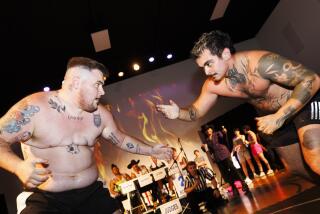Ex-wrestler takes a bite out of political correctness
- Share via
ATLANTA — Welcome to Abdullah the Butcher’s House of Ribs & Chinese Food, a few miles northwest of the Atlanta airport.
Your eponymous host earned his fame as a professional wrestler -- “the Madman From Sudan,” they called him. He started out in a fez, graduated to a kaffiyeh. Over time, he perfected a wild-eyed stare. He dismantled foes with his signature “Sudanese meat cleaver,” a running elbow drop to the throat. He ate light bulbs and raw meat.
He was, in short, a nightmare of political incorrectness.
In real life, the man who insists on going by his “Abdullah” stage name is a sweet sexagenarian, though he remains an imposing lump of man-meat, still quick with the fake scowls and boasting a waistline as wide as a ring of Saturn.
He will reluctantly tell you, after some prodding, that he is, in fact, a Canadian native named Lawrence Shreve, the son of a Blackfoot Indian father and an African American mother.
Abdullah and his wife, who is half-Korean and half-Japanese, thought up the barbecue-and-Chinese-food concept 14 years ago.
Today, he has three locations in metro Atlanta and one in South Korea, where he also claims minor celebrityhood.
After 47 years in “the wrasslin’,” as he calls it, he has scars: Four large ones, a half-inch deep, are carved permanently into his forehead, the legacy of countless sticks, bats and folding chairs. But the wrasslin’ has also taken him around the world, and though he’s a rarity on television these days, he still dons the tights for the occasional smaller match.
If you find the ethnic act offensive, he says, tell it to the wrestling fans of Kuwait and Lebanon. He’s fought as Abdullah in both countries, and it went over great.
“They loved me,” he said, chomping an unlit cigar. “They see me as one of them: powerful, strong.”
If that sounds like he’s endorsing the “they respect a strongman” stereotype, well, maybe this is a good time to note that professional wrestlers are not required to read all those Pew Foundation surveys on the Muslim world and democracy.
After all these years of playacting, Abdullah is no expert on Sudanese culture. But he can speak from experience as a businessman of color in North America, one who lived through the tumult of the 1960s and 1970s, bringing the shtick in a pair of tights.
“Everybody who makes it in this world, they have a gimmick,” he said.
On the walls of the restaurant are photographs of his beefy old friends from wrestling. Many of them are dolled up as the rawest of ethnic caricatures: Kamala the Ugandan Giant, in crude face paint; the Iron Sheik, with his curled-up mustachios; and Wahoo McDaniel, an angry-looking brute in a Native American feathered headdress.
“A very nice guy, Wahoo,” Abdullah said with a nod, adding that McDaniel, as far as he knew, was a bona fide Native American. (McDaniel was.)
Sprinkled among these are pictures of Abdullah’s real-life heroes: the icons of African American protest and progress.
Martin Luther King Jr. is up there. So are Malcolm X, Duke Ellington and a host of local black politicians. A large photo of a triumphant Muhammad Ali hangs above the condiment stand, next to a smaller photo of Abdullah squeezing an opponent’s bloodied head as if it were a troublesome boil.
Abdullah remembers how rooms for rent mysteriously became occupied once white landlords in his native Windsor, Ontario, discovered that the applicants were black.
He watched, to his surprise, as Atlanta opened up to mixed-race wrestling in the 1970s, which gave him new opportunities and a chance to set up a new home in the United States.
He toured America as it grappled with integration, but said he never had any trouble personally. He chalks that up to the magic of fame. “I was Abdullah,” he said. “I was a celebrity.”
Still, he thinks America has some work to do. Take the Don Imus dust-up, for example.
“That B.S. should have never been said,” he growled. “Now everybody’s on TV talking about it. But they’re not going to make the issue any better.”
Racism, he figures, is an unfortunate fact of life. He thinks that if a black guy and a white guy are fighting, a white audience will still tend to pull for the white guy.
In the wrestling world, however, race is only one distinction. Entertainers divide their opponents into “baby faces” -- that is, the crowd favorites and good guys -- and “heels,” the designated villains.
Abdullah spent most of his career as a heel, and he loved every minute of it.
“They threw stuff at me -- the whites threw it, the blacks threw it,” he said.
“But in the end, it was, ‘Can I have your autograph?’ They loved me!”
Love and loathing, fun and fear. Another strange ride on the nonstop multicultural rollercoaster of the American subconscious. Pass the Mongolian beef.


